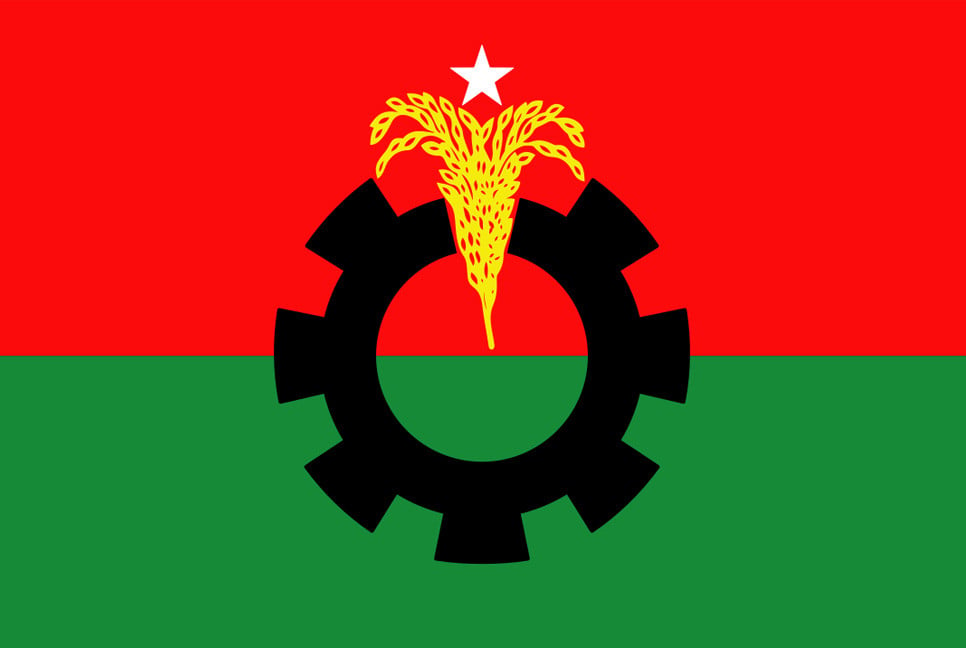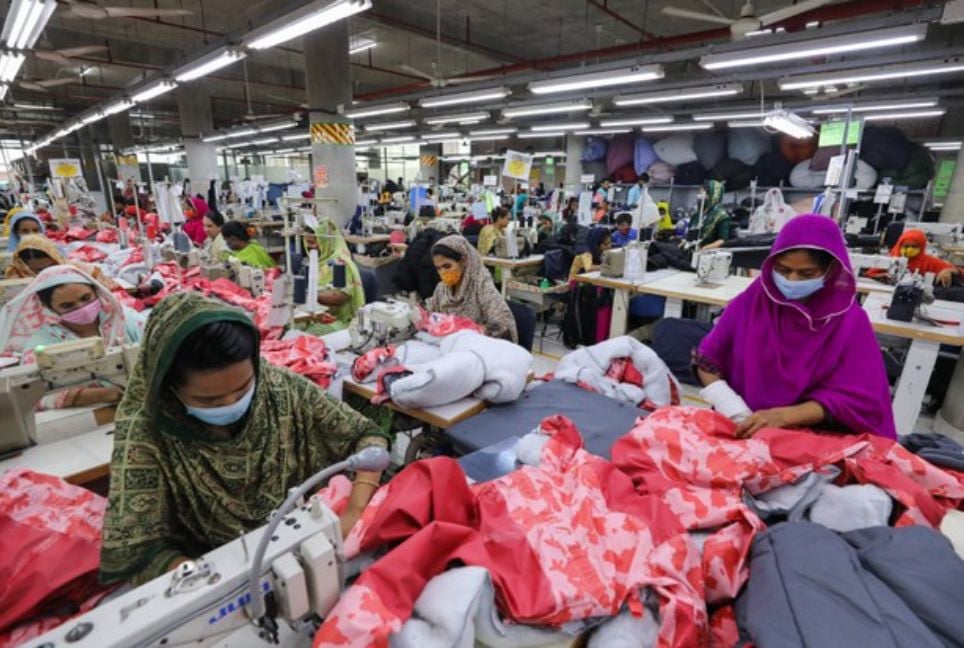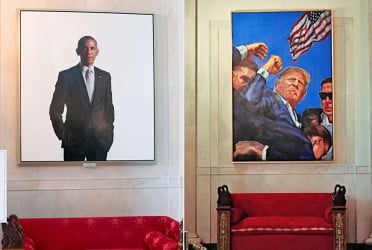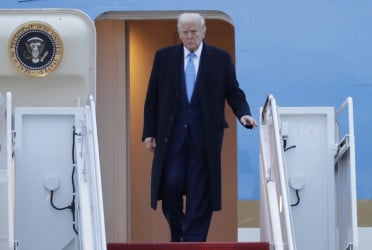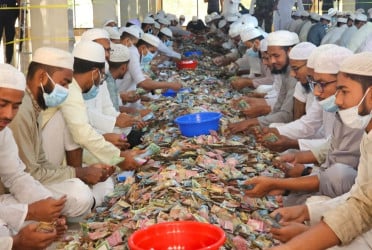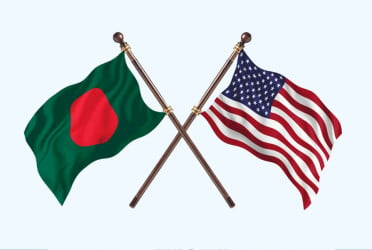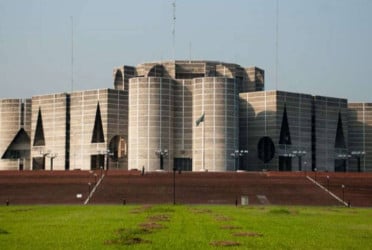The bilateral trade between Bangladesh and the United States reached $10.58 billion in 2024. This includes a trade surplus of $6.15 billion due to gains in garment exports.
According to the US Department of Commerce data, the United States imported $8.37 billion worth of goods from Bangladesh; while Bangladesh imported $2.21 billion worth of goods from the US. Meanwhile, the US supplied Bangladesh with raw materials for industries and capital machinery.
In a major shift in global trade policy, US President Donald Trump announced last Wednesday that retaliatory tariffs would be imposed on several countries, marking the day as America's "Freedom Day."
As part of this new policy, a 37 per cent tariff was imposed on Bangladesh. This step raised concerns about a potential economic crisis and the reduction of trade competition for Bangladesh.
Currently, most Bangladeshi goods are imposed with a 15 per cent tariff in the US According to US data, the largest imports from the US to Bangladesh in 2024 were iron and steel, valued at $650.8 million. Bangladesh also imported $351 million worth of oilseeds and grains, $252 million worth of cotton, and $198 million worth of organic chemicals.
According to industry insiders, Bangladesh's construction and manufacturing industries, including shipbuilding and infrastructure development, are heavily reliant on US iron and steel imports. The agricultural sector in Bangladesh also imports soybean seeds, soybean oil, and raw materials for animal feed.
The ready-made garment industry is a vital component of the country's economy. Bangladesh's textile and garment industry is heavily dependent on US cotton for producing high-quality garments for the international market.
Other notable imports from the US include aircraft engines, liquefied natural gas, whiskey, vehicles, wheat, wood pulp, old ships, soy cake, and almonds.
Additionally, in 2024, Bangladesh imported mineral fuels and oils valued at $188 million, raw materials for the food industry worth $87 million, nuclear reactors and broilers worth $55 million, and electrical machinery and sound equipment worth $47 million.
Further, parts for aircraft and spacecraft were imported, valued at $43 million. US data reveals that Bangladesh imported optical, medical, and surgical instruments worth $42 million, paper and paperboard worth $38 million, and an equivalent amount of grains.
Bangladesh's largest export to the US in the same year was garments, amounting to $7.06 billion. Other significant exports included hats worth $324 million and footwear worth $243 million.
Meanwhile, Bangladesh's textile industry exported $179 million worth of products, along with feathers worth $126 million. Leather goods accounted for $100 million in exports, while optical, medical, or surgical instruments totalled $36 million. Exports of plastics amounted to $22 million, and pharmaceutical products worth $21 million were exported to the US in the year.
gladesh and the United States reached $10.58 billion in 2024. This includes a trade surplus of $6.15 billion due to gains in garment exports.
According to the US Department of Commerce data, the United States imported $8.37 billion worth of goods from Bangladesh; while Bangladesh imported $2.21 billion worth of goods from the US. Meanwhile, the US supplied Bangladesh with raw materials for industries and capital machinery.
In a major shift in global trade policy, US President Donald Trump announced last Wednesday that retaliatory tariffs would be imposed on several countries, marking the day as America's "Freedom Day."
As part of this new policy, a 37 per cent tariff was imposed on Bangladesh. This step raised concerns about a potential economic crisis and the reduction of trade competition for Bangladesh.
Currently, most Bangladeshi goods are imposed with a 15 per cent tariff in the US According to US data, the largest imports from the US to Bangladesh in 2024 were iron and steel, valued at $650.8 million. Bangladesh also imported $351 million worth of oilseeds and grains, $252 million worth of cotton, and $198 million worth of organic chemicals.
According to industry insiders, Bangladesh's construction and manufacturing industries, including shipbuilding and infrastructure development, are heavily reliant on US iron and steel imports. The agricultural sector in Bangladesh also imports soybean seeds, soybean oil, and raw materials for animal feed.
The ready-made garment industry is a vital component of the country's economy. Bangladesh's textile and garment industry is heavily dependent on US cotton for producing high-quality garments for the international market.
Other notable imports from the US include aircraft engines, liquefied natural gas, whiskey, vehicles, wheat, wood pulp, old ships, soy cake, and almonds.
Additionally, in 2024, Bangladesh imported mineral fuels and oils valued at $188 million, raw materials for the food industry worth $87 million, nuclear reactors and broilers worth $55 million, and electrical machinery and sound equipment worth $47 million.
Further, parts for aircraft and spacecraft were imported, valued at $43 million. US data reveals that Bangladesh imported optical, medical, and surgical instruments worth $42 million, paper and paperboard worth $38 million, and an equivalent amount of grains.
Bangladesh's largest export to the US in the same year was garments, amounting to $7.06 billion. Other significant exports included hats worth $324 million and footwear worth $243 million.
Meanwhile, Bangladesh's textile industry exported $179 million worth of products, along with feathers worth $126 million. Leather goods accounted for $100 million in exports, while optical, medical, or surgical instruments totalled $36 million. Exports of plastics amounted to $22 million, and pharmaceutical products worth $21 million were exported to the US in the year.
Translated & edited by Fariha Nowshin Chinika




